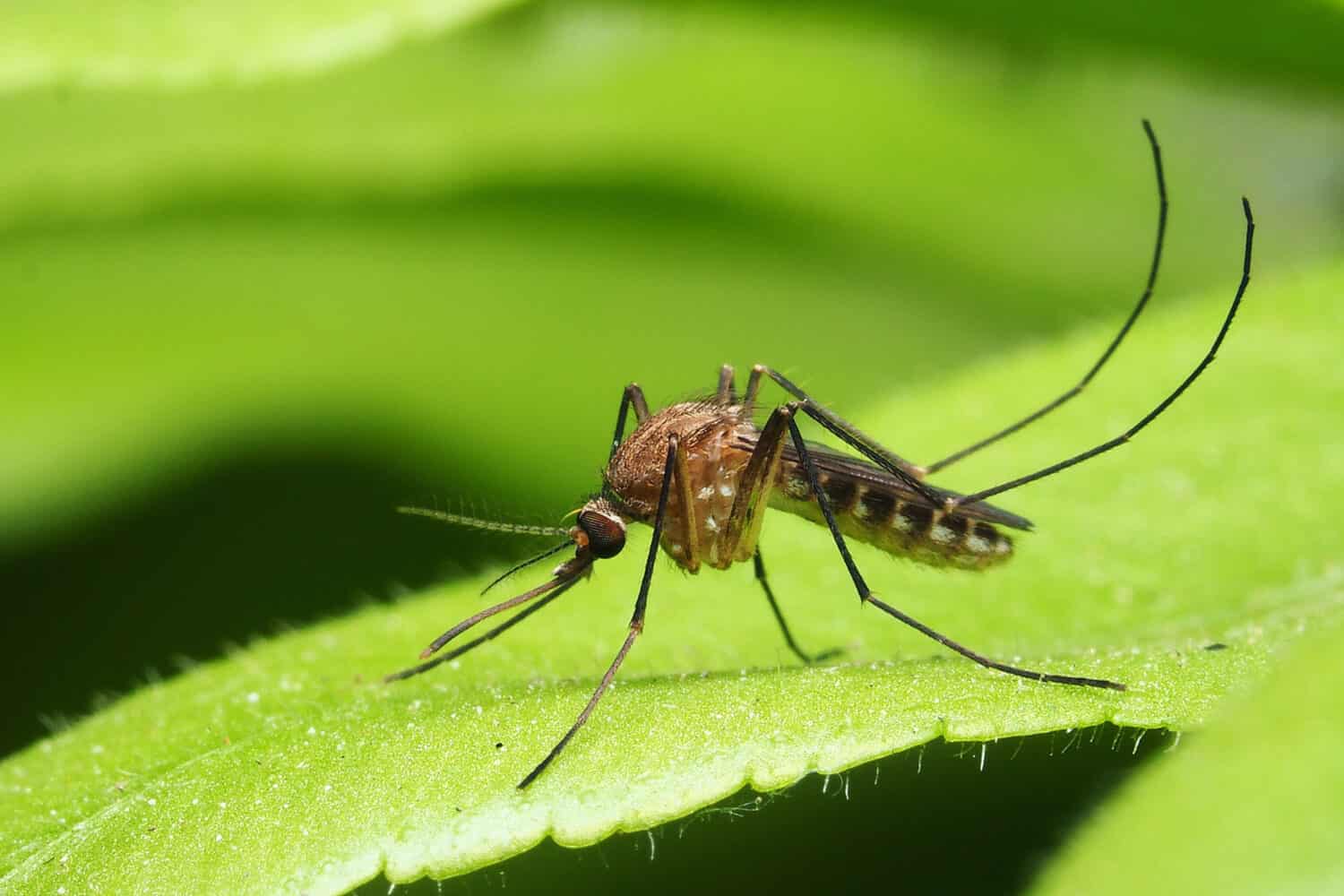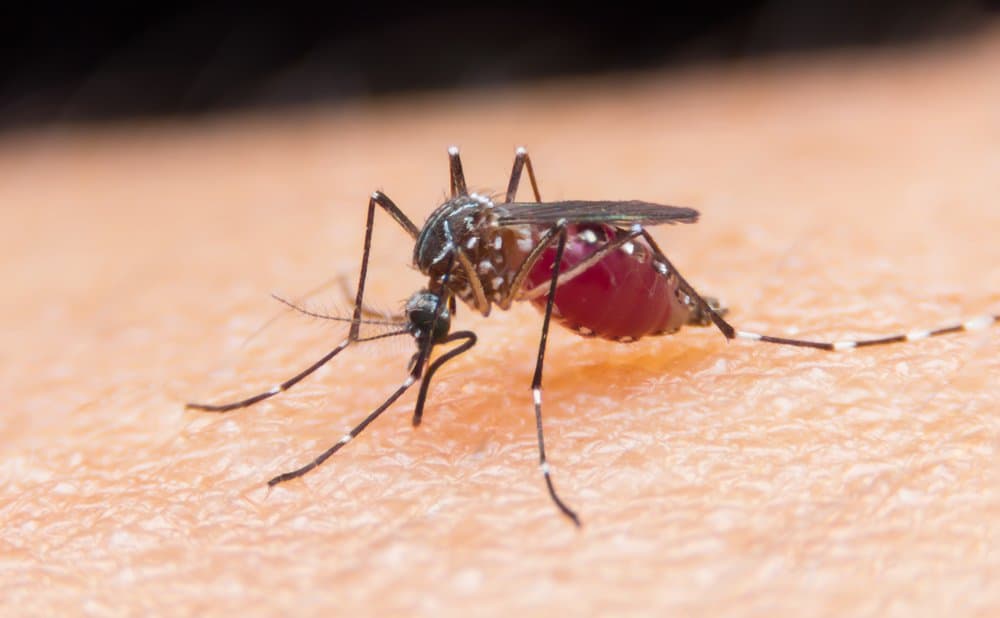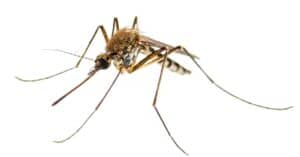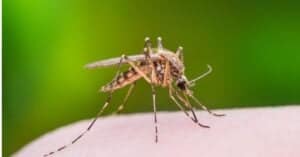Understanding why scientists released genetically-modified mosquitoes in Florida requires gaining a sense of the challenges we face in controlling these pests. While not all mosquitoes are dangerous, invasive, disease-carrying species threaten our health as well endanger our pets and wildlife. It makes sense that we want to do everything in our power to stop them from reproducing. Or better yet, to eliminate them entirely.
Still, methods for controlling invasive mosquitoes populations are controversial. There is growing public concern over the use of chemical repellents and insecticides. People worry that they harm humans, animals, vital insects, like bees, and the environment as a whole. Commonly used pyrethrins, for example – chemicals derived from chrysanthemum flowers – are toxic to all insects, not just mosquitoes. Misuse or overuse of mosquito control chemicals can therefore disrupt entire ecosystems, and kill off useful and necessary pollinators.
Chemical methods are met with suspicion because they pose a substantial risk to our health, particularly for sensitive individuals. Exposure to high concentrations of certain insecticides can cause skin irritation, respiratory problems, and even more severe and lasting health issues.
On an individual level, natural, plant-based repellents made are somewhat limited in their ability to protect us.
Relying solely on chemical control methods may not be sustainable in the long term, leading scientists to explore biological solutions instead.
Mosquitoes are Important to the Ecosystem, But They Are Also Itchy Vectors of Disease

Mosquitoes play an important role in the ecosystem as pollinators and as as a food source for mammals, reptiles, and other insects but some species are harmful vectors of disease.
©jiade/Shutterstock.com
Let’s face it, we all hate mosquitoes. For humans, they are a nuisance at best, and deadly at worst. While most species are harmless, we all know that others are menacing vectors of disease, indiscriminately spreading malaria, Zika virus, West Nile virus, Chikungunya virus, and dengue around the world. These tiny terrors have long been – and remain – among the leading cause of disease and death across the globe. Just thinking about mosquitoes is enough to make your skin crawl.
On one hand, the majority of mosquitoes serve an important purpose in nature, playing a necessary role in the ecosystem. As pollinators, their main source of nourishment is actually nectar, not blood. Just like bees, they transport nectar from flower to flower to fertilize plants and help them reproduce. They are also the primary food sources for mammals, reptiles, and insects like bats, dragonflies, frogs, turtles, and birds, particularly hummingbirds. In these roles, they deserve some respect.
On the other hand, mosquitoes are also resilient pests that have evolved to bite humans for survival. And we aren’t alone. Animals, both wild and domestic, are also susceptible to mosquito-borne illnesses. In fact, as carriers of parasites, mosquitos threaten our beloved companions, infecting over 100,000 dogs every year with heartworm disease – a serious and potentially fatal condition that often requires extensive and expensive treatment. As climate change continues to increase precipitation and raise both temperature and humidity levels everywhere on earth, it creates ideal conditions for mosquito populations to thrive and multiply in, thus exacerbating the already-concerning public health crisis of disease outbreaks mosquitoes cause for humans, pets, and wildlife. If itchiness were the only problem, we might forgive them. Instead, mosquitoes are all too often a scourge.
Mosquito Management Is a Delicate Balance

Preventing mosquito bites has become big business with the global repellant market estimated at $6.51 billion and growing.
©iStock.com/Lifemoment
Because of the dangers mosquitoes pose, preventing bites is understandably big business. Experts have valued the global human mosquito repellent market size at $6.51 billion in 2022, projecting it will grow to to $9.30 billion by 2029. Preventative medications for pets that protect against flea, tick, and heartworm disease were estimated at 3.3 billion in 2018, an industry that continues to grow exponentially.
While we work to protect ourselves against bites on an individual level, local and state agencies work to control populations at the source. Yet due to their importance in the ecosystem and the environmental dangers of certain methods of mosquito control, we have to be thoughtful in our approaches. Current methods can and frequently do disrupt the delicate balance of nature. Chemical insecticides, for instance, can harm non-target species, including beneficial insects, amphibians, birds, and fish. Larvicides or adulticides applied to bodies of water where mosquitoes breed can cause contamination, negatively impacting aquatic organisms, including fish and other aquatic life. Aerial spraying of insecticides can also threaten vital pollinators like bees and butterflies.
Non-chemical control methods, such as removing mosquito breeding sites, improving sanitation, and using physical barriers like bed nets, are already in use. These sustainable mosquito control strategies aim to protect public health while minimizing harm to the environment.
But scientists want to find more effective solutions, which is where genetically modified mosquitoes come into play.
The Florida Experiment Using Genetically Modified Mosquitoes (GMMs)
Given their hazardous effects, it is no surprise that researchers have been hard at work figuring out how to lessen, if not completely eradicate, disease-carrying mosquito populations. Many also want to do so safely, with minimal harm to the environment and other pollinators. Again, only a few species of mosquitoes are worrisome and thus the subject of scientific interest. Of particular concern are Aedes aegypti, an invasive species responsible for spreading Zika, dengue, chikungunya, yellow fever, and other potentially fatal viruses. To this end, the biotechnology firm, Oxitec, whose mission is to manufacture sustainable, chemical-free, and non-toxic solutions for pest control, launched a federally-approved experiment to combat them. In 2021, they released tens of thousands of genetically-modified Aedes aegypti eggs into the Florida Keys.

Tens of thousands of genetically modified mosquitoes were hatched in the Florida Keys.
©Bertl123/Shutterstock.com
Male mosquitoes, who never bite, were modified to carry a gene that makes their female offspring reliant upon on tetracycline. But because they don’t get this antibiotic in nature, they do not survive to adulthood. Over several generations of mating, the number of females is greatly reduced. The modified males die as well in what scientists call a self-limiting process. Supporters of this experiment thought it might be a clever way to kill bad insects while protecting the good ones. The idea was to protect both the environment and people at once. By bad insects, they are referring to invasive species that do not have a useful place in ecosystem, as is the case with Aedes aegypti.
Genetically Modified Mosquito Controversy
In 2016, the U.S. Food and Drug Administration gave Oxitec authorization for the genetically modified mosquito project, followed by the Environmental Protection Agency in 2020. While these organizations gave legitimacy to the experiment, scientists and environmental and health advocates remained skeptical. To begin, even though using GMMs for mosquito control may like sound a good – even brilliant – idea in theory, experts worried that Oxitec had not done proper testing to ensure public safety. Oxitec first released their modified mosquitoes in Itaberaba, Brazil, ten years ago, but had not done enough to assuage concerns. And once these insects are released, physicians explained, they cannot be recalled if they are wreaking havoc.
Oxitec had originally planned to further its experiment in California, but has recently withdrawn is application under intense scrutiny and suspicion. The company has claimed that they have a 98% efficacy rate in killing off Aedes aegypti populations. However, there has been no evidence to support the veracity of these statements. Officials across multiple agencies raised concerns about the potential for Oxitec’s mosquitoes to spread antibiotic resistance. They also called out the unethical implications of exposing Tulare County, CA residents to unknown harm. Oxitec, they argued, would subject citizens to an experiment they had not consented to participate in in the first place.
Given the challenges with pesticides and insecticides, it is easy to see the appeal of using biotechnology to control mosquitoes. But those methods can also create problems of their own. While Oxitec still has approval in Monroe County, FL, it is not going to continue its program in California. Until biotech companies produce clearer results, the controversy surrounding genetically modified mosquitoes is likely to continue.
It is worth noting that mosquito control, above all, is both a social justice and a democratizing issue. The allocation of resources, such as funding, infrastructure, and expertise must be readily available to communities in need. Accessibility helps level the playing field and ensures that everyone has equal access to essential public health services. Mosquito control programs can also involve community engagement and participation, empowering local residents to take an active role in disease prevention. By involving communities in decision-making processes, education, and implementation of control measures, mosquito control initiatives can foster a sense of ownership and agency among community members, ultimately empowering them to protect their own health and well-being.
By taking a proactive and inclusive approach, mosquito control efforts can prioritize the protection of both public health and the environment, ensuring that disadvantaged communities are not disproportionately burdened by negative environmental consequences.
Genetically modified mosquitoes may one day become safe and effective. In the meantime, we will all keep spraying and hoping for better solutions to a growing problem.
Thank you for reading! Have some feedback for us? Contact the AZ Animals editorial team.








